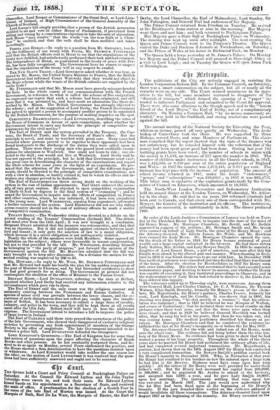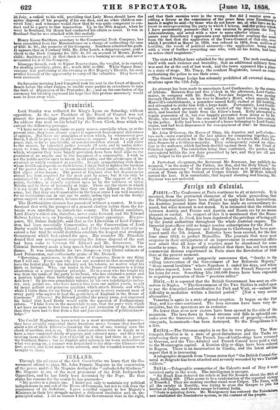311rtrupplto.
The politicians of the City are actively engaged in resisting the London Corporation Reform Bill. In the Common Council, on Saturday, there was a smart conversation on the subject, but all or nearly all the remarks were on one side. The Court seemed unanimous in its oppo- sition to the bill, but some members ventured to disapprove of the "flourish of trumpets" which formed the opening of a " paper " in- tended to influence Parliament and submitted to the Court for approval. There were also some allusions to the Slough speech and to the " bosom friend of the Lord Mayor," the Earl of Derby, not of a complimentary character. On Monday a Common Hall, " by no means numerously at- tended," was held in the Guildhall, and strong resolutions were passed- against the bill.
The annual meeting of the National Society for Educating the Poor, whilom so stormy, passed off very quietly on Wednesday. The Arch- bishop of Canterbury took the chair. He was supported by three Bishops, several Peers, and some Members of Parliament. The chair- man remarked that the report showed that the state of the finances was not satisfactory, but he consoled himself with the reflection that if the money had been spent great good had been done. During last year 182 building grants have been voted ; the number of schools in union with the society is 11,133, an increase of 277 upon the number in 1857. The number of children under instruction in all the Church schools, in 184'7, was 1,422,569, or 8.2.59 per cent of the entire population of England and Wales : in 1857 the number was 1,672,445, or 8.611 per cent. The increase has kept pace with the increase of population. The amount of school income returned in 1847, under the heads " endowment," " pence " and "subscriptions" was 510,0311.; in 1857 it was 682,475/. This latter sum is exclusive of the capitation grants made by the Com- mittee of Council on Education, which amounted to 18,9351.
The North-West London Preventive and Reformatory Institution held its annual dinner at the London Tavern, on Wednesday, Mr. Adder- ley in the chair. He said that in six years 200 reformed criminals had been sent to Canada, and that every one of them corresponded with Mr. Bowyer, the founder of the institution and its officers. The institution, although so successful, is unfortunately in debt. The dinner produced 700/.
By order of the Lords Justices a Commission of Lunacy was held on Tues- day at the Thatched House Tavern to inquire into the state of the mind of Sir Henry Meux. Mr. Montague Chambers, Mr. Bovill, and Mr. Bodkin
appeared in support of the petition ; Mr. Montagu Smith and Mr. Quoin were counsel on behalf of Lady Smith, the sister of Sir Henry Meux ; and the Attorney-General, Mr. Edwin James, Mr. Wilde, and Mr. Hawkins were counsel for Lady Mcux. Mr. Montague Chambers opened the case. On the death of his father in 1841 Sir Henry became possessed of great wealth and a large capital embarked in the brewery. He had three sisters Lady Malden, Mrs. Arabin, and Lady Bowyer Smijth. In 1865 he married a daughter of Lord Ernest Bruce, a girl of nineteen, and soon after this his friends were struck by his altered gait and manner. When shooting in Scot- land in 1856 it was found dangerous to go out withhim. In December 1856 four medical gentlemen were consulted and they decided that there was disease of the brain. After the election for Hertfordshire in 1857 Sir Henry sank into utter imbecility. His sisters had ascertained that he had executed some testamentary paper, and desiring to know its nature, and whether Sir Henry was capable of executing it, they instituted proceedings in Chancery, and as the representatives of Lady Meux had refused to discover it, the Lords Jus- tices ordered this inquiry. The witnesses called up to Thursday night, were numerous. Among them were General Hall, Lord Charles Clinton' Dr. C. J. Williams, Dr. Thomas Watson, Elias Smith Bromsby, formerly Sir Henry's groom of the cham- bers Mr. Majoribanks, Sir Henry's partner, Charles Tessier, formerly his cook, Lord Ranelagh, and Dr. Conolly. It was shown that in 1856, his shooting was dangerous, " he shot merely at a venture "; that his articu- lation was indistinct ; that in 1857 he believed he was Marquis of Walton, and owner of Cashiobury ; that he declared there were bread crumbs on the pictures when there were none, and that the doors were open when they were closed ; and that in 1858 he believed General Havelock was burned alive, that he rang his bell in his grave, that then he was taken out, and was coming home. The medical gentlemen described his disease as pa- ralysis. Mr. Montague Chambers said that he considered the evidence es- tablished the fact of Sir Henry's incapacity on or before the let May 18.57. The Attorney-General, for the wife and infant son of Sir Henry, went over the whole case. The evidence did not bring before them the true his- tory of Sir Henry Meux. No evidence had been given to show that he had wasted a penny of his large property. Throughout the whole of the three years since he married Sir Henry had performed the ordinary affairs of life, and had completed several important transactions. Mr. Majoribanks, a partner, had shown that on the 10th August 1857 Sir Henry had conducted. a very complicated transaction. Sir Bowyer Smij.th's petition carried back Sir Henry's insanity to December 1856. Why, in November of that year Sir Henry had remitted to his brother-in-law the interest upon a large sum he had lent to Sir Bowyer. Madness must have come upon him very quickly All the sisters of Sir Henry were well provided for under their father's will. But Sir Henry had increased his capital from 200,000/. to 500,0001.; and he appointed Mr. Arabin to attend at the brewery, and assigned him 12001. a year, and he gave Lady Smijth 18,000/. i upon her marriage. The instrument settling that sum upon her was executed in March 1857. The jury would now understand why the 1st May had been fixed upon as the beginning of Sir Henry's insanity. If the jury founded their verdict on the evidence adduced it would invalidate all these transactions. The Attorney-General fixed upon August 1857 as the beginning of the insanity. Sir Henry executed on the 3d July, a codicil to his will, providing that Lady Aleut should have the entire disposal of his property if his son died, and no other children sur- vived him ; and witnesses would show that he was quite competent to con- duct and be a party to that transaction. Up to the 20th August, when he went to Scotland, Sir Henry had conducted hisaffairs as usual. It was in Scotland that he was attacked with this malady.
• Henry Keene Smithers, secretary to the Commercial Dock Company, has been oommitted from the Mansionhouse on a charge of embezzling the sum of 2511. 3s. 94.' the property of the Company. Smithers admitted his guilt. It appears that February 1855, Mr. John Lamb, a shipping-agent, paid a check to the Dock Company for 2511. 3s. 94. on account of Messrs. Roths- child; Smithers paid in that check to his own banking account, and never accounted for it to the Company.
Giuseppe Grandi, cook to Signor Beneventano, the vocalist, is in custody for stealing jewellery,.plate, &c., worth 5001. to 6001. While Signor Bane- ventano was performing in the evening at Her Majesty's Theatre, his cook availed himself of the opportunity to carry off the valuables. They have all been recovered.
On Saturday morning Lord Campbell took his seat in the Court of Queen's Bench before the other Judges, to enable some parties in attendance to take the Oath of Abjuration of the Pretender, &e. ; and on the conclusion of the ceremony his lordship expressed his hope that this profane mummery would soon be done away with.



























 Previous page
Previous page